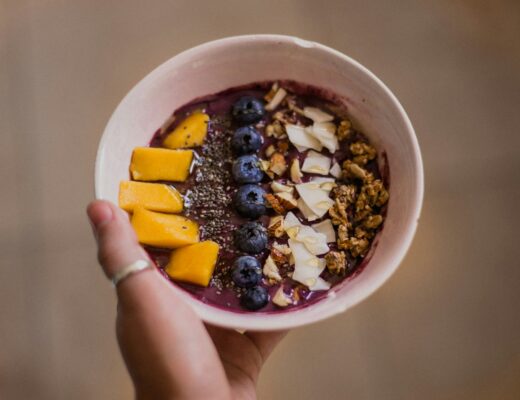Did you know that what you eat doesn’t just affect your physical health, but your mental well-being too? Nutrition and mental health are deeply interconnected, with specific foods offering the power to enhance brain health, elevate mood, and contribute to holistic wellness.
In this comprehensive guide, we’ll explore how your diet impacts your mind and provide practical tips on incorporating mood boosting foods into your daily routine. By the end, you’ll have clear, actionable ways to use nutrition to support your mental health.
Fueling Your Brain with the Right Nutrients
Why Brain Health Depends on Your Diet
The brain is one of the most energy-demanding organs in your body, consuming approximately 20% of your daily calorie intake. It requires a steady supply of nutrients to function properly, repair cells, and protect against cognitive decline.
Key nutrients like omega-3 fatty acids, vitamins B and D, and minerals such as magnesium and zinc contribute significantly to brain health. Without these, functions like memory, focus, and emotional regulation may suffer.
Essential nutrients that power mental well-being
- Omega-3 Fatty Acids
Found in fatty fish like salmon and chia seeds, omega-3s maintain cell membrane integrity and reduce inflammation in the brain.
- B Vitamins
Folate and B12 play a critical role in producing neurotransmitters linked to mood regulation. Leafy vegetables and fortified cereals are great sources.
- Magnesium
Vital for neurotransmitter function and stress regulation, magnesium-rich foods include nuts, seeds, and whole grains. By consistently providing your body with these nutrients, you’re giving your brain the tools it needs to thrive.
Gut and Brain The Surprising Link
The Role of the Gut-Brain Axis
A healthy gut promotes a healthy mind. The gut-brain axis is the communication network that links your digestive system to your brain through the vagus nerve and billions of gut bacteria.
Probiotics and mental health
Consuming probiotic-rich foods like yogurt, kefir, and fermented vegetables helps diversify gut bacteria, which in turn improves mood and cognitive function.
How Gut Health Influences Mood
Studies show that a disrupted microbiome can lead to issues like anxiety and depression. Meanwhile, diets rich in whole foods foster beneficial bacteria that uplift your mental state. Taking care of your gut is just as important for mood regulation as it is for digestion.
The Hidden Effects of Processed Foods
Mood Dips from Unhealthy Eating
Sugar-filled snacks, refined carbs, and highly processed foods may provide temporary satisfaction but often result in mood crashes and lingering fatigue. Diets high in these substances have been linked to increased symptoms of anxiety and depression.
Why Balanced Blood Sugar Matters
Stable blood sugar levels prevent energy dips and promote mental clarity. To manage blood sugar effectively, prioritize complex carbs like quinoa, oats, and sweet potatoes over processed sugar. Consistently choosing whole, minimally processed foods can protect your mood and prevent those “sugar slump” moments.
Mood Boosting Foods to Add to Your Plate
Top Foods for Uplifting Mental Health
What you eat can directly influence neurotransmitter activity, mood regulation, and brain function. Incorporate these foods for a mental health boost:
- Dark Chocolate
Loaded with flavonoids, dark chocolate increases blood flow to the brain.
- Blueberries
High in antioxidants, they protect against oxidative stress and improve focus.
- Avocado
Rich in healthy fats and potassium, which contribute to neuron function.
- Spinach
Packed with magnesium, it calms the nervous system and reduces anxiety.
- Walnuts
One of the richest plant-based sources of omega-3s, essential for brain health.
By adding these feel-good foods to your diet, you can nurture both body and mind.
Small Changes That Make a Big Impact
Steps Toward Holistic Wellness
Transforming your diet doesn’t have to be overwhelming. Start small by making simple swaps that enhance mental and physical health.
- Replace soda with herbal tea or infused water.
- Switch white bread for whole grain or multigrain options.
- Make room for greens by adding a salad to one meal each day.
- Swap fried snacks with nuts, seeds, or baked options.
Consistency adds up quickly. Small, manageable changes can have a profound impact on your holistic well-being.
Food and Stress Management
Nutritional Ways to Combat Stress
Many foods help reduce the effects of stress on the body and mind. Focus on eating meals with high protein, fiber, and fat content to stabilize your energy levels throughout the day.
- Chamomile Tea helps calm nerves and promote relaxation.
- Bananas packed with B6, aid in the production of serotonin, the “happy hormone.”
- Oily Fish like sardines and salmon lower cortisol levels, aiding stress relief.
Creating meal routines that prioritize these foods can significantly reduce the effects of stress during hectic days.
Build a Balanced Lifestyle with Smart Nutrition
Your nutrition choices are a powerful tool for mental health. From improving brain function to stabilizing mood swings, the connection between food and your well-being cannot be overstated.
The steps above are a great starting point in your wellness journey. Why not begin today? Add at least one brain-boosting food to your next meal or try a gut-friendly snack this week.
If you’re ready to take a deeper step into holistic wellness, explore our exclusive guide to mood-enhancing nutrition. Because every change, no matter how small, is a step toward a healthier, happier you.







